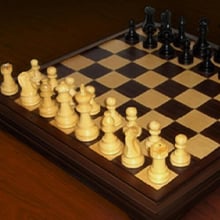
Chess Games
Discover 8 amazing chess games. Play for free and have fun!
About Chess Games
What are Chess Games?
Chess is a classic board game that has been enjoyed by people around the world for centuries. It is a two-player strategy game played on a square board divided into 64 squares arranged in an 8x8 grid. Each player starts with 16 pieces: one king, one queen, two rooks, two knights, two bishops, and eight pawns. The objective of the game is to checkmate the opponent's king, meaning the king is in a position to be captured and cannot escape. Chess is renowned for its complexity, requiring players to think several moves ahead, anticipate their opponent's actions, and formulate strategic plans to secure victory.
Origin of Chess Games
While the exact origins remain uncertain, the earliest known forms of chess-like games date back thousands of years.
One popular theory suggests that chess originated in ancient India, where it was known as "chaturanga" or "four divisions of the military." Chaturanga was played on an 8x8 board and featured pieces representing different elements of the Indian army: infantry, cavalry, elephants, and chariots. This early version of chess spread to Persia (modern-day Iran) and was further developed into "shatranj," which became popular in the Islamic world.
Another theory proposes that chess originated in China, where a similar game called "xiangqi" was played as early as the 7th century. Xiangqi features pieces representing different divisions of the Chinese army and is played on a board with intersecting lines rather than squares.
Some historians suggest that chess may have evolved independently in multiple cultures, with different variations emerging over time.
Regardless of its exact origins, chess gained popularity throughout the medieval period in Europe and the Islamic world, undergoing numerous changes and refinements along the way. The modern rules of chess began to take shape in the 15th century, with the introduction of new pieces such as the queen and changes to the movement of existing pieces.
Today, chess is played and enjoyed by millions of people around the world, both casually and competitively. It is recognized as a game of skill, strategy, and intellectual challenge, with a rich history and enduring appeal that continues to captivate players of all ages.
Tips for Winning Chess Games?
Winning at chess requires a combination of strategic thinking, tactical awareness, and careful planning. Here are some tips to improve your chess game and increase your chances of winning:
Control the Center: The center of the board is the most strategically important area. Try to occupy and control the central squares with your pieces, as this gives you more options and flexibility for launching attacks or defending your position.
Develop Your Pieces: In the opening phase of the game, focus on developing your pieces (knights, bishops, rooks) and bringing them into active positions. Aim to control key squares and lines while simultaneously protecting your own pieces.
Castle Early: Castling is an important defensive maneuver that protects your king and brings your rook into play. Try to castle early in the game to safeguard your king and connect your rooks.
Think Ahead: Anticipate your opponent's moves and consider their potential threats. Think several moves ahead and formulate a plan based on both your own objectives and your opponent's likely responses.
Control the Tempo: Try to dictate the pace of the game by making threats, forcing your opponent to react, and seizing the initiative. Look for opportunities to gain tempo by making moves that put pressure on your opponent's position.
Maintain a Strong Pawn Structure: Pawns are the foundation of your position. Maintain a solid pawn structure that supports your pieces and limits your opponent's mobility. Avoid creating weaknesses that can be exploited later in the game.
Use Tactics: Look for tactical opportunities to gain material or create threats. Common tactics include forks, pins, skewers, and discovered attacks. Practice recognizing these tactical motifs and exploiting them in your games.
Control the Open Files: Open files (columns) are valuable assets that allow your rooks to penetrate into your opponent's position. Control the open files and use your rooks to apply pressure along them.
Evaluate Trades: Assess the consequences of piece exchanges before making them. Consider factors such as material imbalance, positional advantages, and the resulting pawn structures.
Stay Flexible: Be prepared to adapt your plans based on changes in the position. Remain flexible and responsive to your opponent's moves, adjusting your strategy as needed to maintain the initiative.








